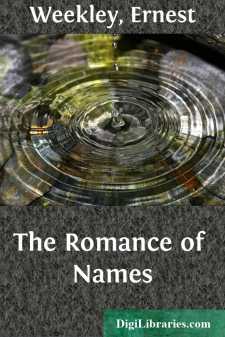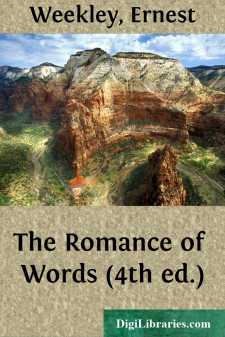Categories
- Antiques & Collectibles 13
- Architecture 36
- Art 48
- Bibles 22
- Biography & Autobiography 813
- Body, Mind & Spirit 142
- Business & Economics 28
- Children's Books 15
- Children's Fiction 12
- Computers 4
- Cooking 94
- Crafts & Hobbies 4
- Drama 346
- Education 46
- Family & Relationships 57
- Fiction 11828
- Games 19
- Gardening 17
- Health & Fitness 34
- History 1377
- House & Home 1
- Humor 147
- Juvenile Fiction 1873
- Juvenile Nonfiction 202
- Language Arts & Disciplines 88
- Law 16
- Literary Collections 686
- Literary Criticism 179
- Mathematics 13
- Medical 41
- Music 40
- Nature 179
- Non-Classifiable 1768
- Performing Arts 7
- Periodicals 1453
- Philosophy 64
- Photography 2
- Poetry 896
- Political Science 203
- Psychology 42
- Reference 154
- Religion 513
- Science 126
- Self-Help 84
- Social Science 81
- Sports & Recreation 34
- Study Aids 3
- Technology & Engineering 59
- Transportation 23
- Travel 463
- True Crime 29
Ernest Weekley
Ernest Weekley (1865–1954) was a prominent British philologist and academic, best known for his work in etymology and linguistics. He served as a professor of modern languages at the University of Nottingham and authored several influential works on the history of the English language. His most notable books include "An Etymological Dictionary of Modern English" and "The Romance of Names," which explored the origins and meanings of words and surnames. Weekley was also the first husband of writer D.H. Lawrence’s wife, Frieda von Richthofen, a relationship that brought some attention to his personal life.
Author's Books:
Sort by:
by:
Ernest Weekley
CHAPTER I OF SURNAMES IN GENERAL "The French and we termed them Surnames, not because they are the names of the Sire, or the father,but because they are super-added to Christian names." (CAMDEN, Remains concerning Britain.) The study of the origin of family names is at the same time quite simple and very difficult. Its simplicity consists in the fact that surnames can only come into existence...
more...
by:
Ernest Weekley
PREFACE A long and somewhat varied experience in language teaching has convinced me that there are still, in spite of the march of science, many people who are capable of getting intellectual pleasure from word-history. I hope that to such people this little book, the amusement of occasional leisure, will not be unwelcome. It differs, I believe, from any other popular book on language in that it deals...
more...



